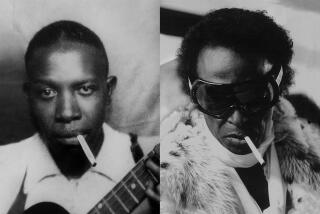Who will lead MOCA?
- Share via
Jeffrey Deitch’s embattled stewardship of the Museum of Contemporary Art has ended with his resignation as director three years into his five-year contract. That’s probably a good thing for the museum, which was under serious financial strain for most of his tenure even as it engaged in a bitter battle over the artistic direction in which it was moving.
Deitch was a risky hire from the start, an innovative but untested New York gallery owner tapped for a job that traditionally goes to someone with a scholarly, curatorial background and administrative experience. Although he had a number of successes — most notably the popular 2011 “Art in the Streets” graffiti exhibition in which he emphasized the symbiosis between art and pop culture — his tenure was overshadowed by his failings. He struggled with fundraising, and he overburdened himself as an administrator. He watched as his staff dwindled, and he alienated all four artists on the board of a museum that prided itself on its connection to local artists. They resigned last summer.
As MOCA’s board members begin a worldwide search for a new director, we hope that they are not so chastened by the recent tumult that they will settle for a dull, safe or predictable choice. That said, there are some lessons to be learned from the missteps of the last few years.
GRAPHIC: MOCA’s relationship with Jeffrey Deitch
The next director must certainly be an expert in contemporary art with a strong curatorial vision. But it is imperative that he or she also be an indefatigable fundraiser capable of mesmerizing the wealthy into parting with their money. (See: Michael Govan, director of the Los Angeles County Museum of Art.) As fun as it would be for the new director to spend his or her time thinking exclusively about art, the reality is that MOCA can’t exist without private donations — and lots of them. In recent months (since the museum nearly merged with LACMA out of financial necessity), the MOCA board has raised about $80 million, and it intends to get the endowment up to $100 million. The new director will start off with a much healthier museum, and he or she should work to keep it that way.
The corollary is this: The new director must recognize that the job requires managing the staff and the institution and cultivating talented curators, not trying to be the head curator himself. Deitch’s problem last summer wasn’t only that he lost chief curator Paul Schimmel; it was also that he failed to replace him. Deitch apparently believed he could do the job.
Whoever takes over should work to bring artists back into the fold while finding new ways to bring the public through the doors. Making a museum both erudite and popular is an extraordinary challenge. The MOCA board members should take their time finding a director who will oversee the museum capably and imaginatively.
More to Read
A cure for the common opinion
Get thought-provoking perspectives with our weekly newsletter.
You may occasionally receive promotional content from the Los Angeles Times.










